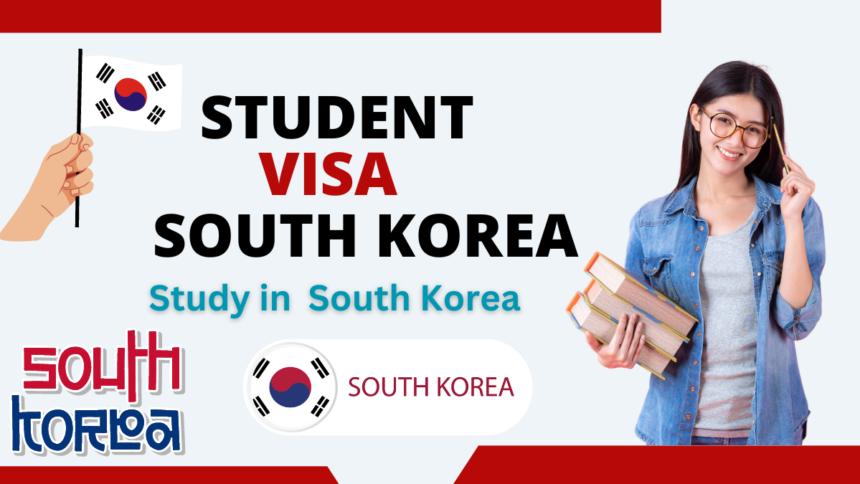The South Korean student visa, commonly known as the D-2 visa, is issued to overseas students seeking to complete undergraduate or postgraduate studies at a South Korean educational institution.
It enables students to stay in South Korea for the duration of their academic program and can be extended if the course of study exceeds the initial visa period. This visa is required not only for admission into South Korea but also for other administrative procedures once the student has arrived in the country.
Eligibility Criteria
To qualify for a South Korean Student Visa, you must satisfy the following criteria:
Acceptance from an Accredited Institution: The most important prerequisite is that you have been admitted to a full-time course at an acceptable South Korean educational institution. This covers universities, colleges, and graduate institutions. It is critical to confirm if the institution is accredited and recognized by the South Korean government.
Financial Stability:South Korea aims to make sure that overseas students can sustain themselves during their stay. As a result, you must be able to offer proof of adequate means to cover tuition and living expenses throughout your stay. This is to satisfy the South Korean authorities that you will not require public subsidies or employment to support your education and costs of living.
Health and Character: The applicant must be in excellent health and character. It is crucial that you have no criminal record, and you may be required to present a police certificate to prove this. Some students may also be required to undertake a health check, which may involve a medical examination or a tuberculosis (TB) test, depending on the condition in their native country.
South Korean Student Visa Required Documents
- Application Form: You must complete the D-2 visa application form. This form requests information about your personal data, educational history, study plans in South Korea, and financial capabilities.
- Passport: Your passport must be valid for at least six months after your planned stay in South Korea. It should also include at least one blank sheet for visa stamps.
- Photographs: You must give two passport-sized pictures taken within the last six months. The photos should be clear and in color, with a basic white or off-white backdrop.
- Admission Letter: You will require a certificate of admission or an invitation letter from the South Korean educational institution that you want to attend. This letter must identify your course of study, its duration, and other relevant data.
- Proof of Academic Qualifications: You’ll need to send transcripts and diplomas from before educational institutions. This serves as documentation that you meet the requirements to pursue your planned course of study in South Korea.
- Financial Proof: You must give proof that you have enough money to pay your tuition and living expenses for the duration of your studies. This might take the shape of a bank statement indicating sufficient finances, a scholarship certificate if you’ve been given one, or a letter from a financial sponsor accepting to help you financially during your stay.
- Fee: You will have to pay the non-refundable visa application cost. The actual amount may differ depending on your nationality and area of application.
These are the general criteria; the embassy or consulate may request additional papers if necessary.
Visa Application Process
- Admission: Before applying for a D-2 visa, you must first be accepted into a South Korean institution or college. Apply for your preferred course, and once approved, you will receive an acceptance letter, which is required for visa applications.
- Application Submission: Next, submit your visa application to the Korean embassy or consulate in your native country. You must complete the application form and submit it with all required documentation.
- Interview: Depending on the embassy or consulate, you may be required to attend an interview. This is a standard component of the procedure in which you will be asked about your study plans in South Korea.
- Visa Issuance: When your visa is accepted, the embassy or consulate will place a visa sticker on your passport. This might take a few days or weeks.
Also See: Work Permit in South Korea 2024
South Korea Student Visa Cost
| COST ITEM | AMOUNT (KRW) | APPROXIMATE AMOUNT (USD) |
|---|---|---|
| D-2 Visa Costs | ||
| Visa Application Fee (D-2 Visa) | 120,000 | $88.50 |
| Visa Extension Fee | 50,000 | $37 |
| Shipping Fees | – | $15 to $50 |
| Translation Services (per page) | – | $20 to $50 |
| Visa Processing Service Fees | – | $50 to $200 |
| Expedited Processing Fees | – | $25 to $75 |
| Document Authentication Fees (per doc) | – | $20 to $100 |
| Health Insurance (monthly) | – | $20 to $30 |
| University Tuition Fees (2024) | ||
| Average Annual Tuition Fee | 6,800,000 | $5,032 |
| Public Universities (per semester) | 4,000,000 | $2,960 |
| Private Universities (per semester) | 6,500,000 | $4,810 |
| SNU Undergrad (low range per semester) | 2,460,000 | $1,820.4 |
| SNU Undergrad (high range per semester) | 5,074,000 | $3,754.76 |
| SNU Grad (low range per semester) | 2,503,000 | $1,852.22 |
| SNU Grad (high range per semester) | 8,540,000 | $6,319.6 |
| Chonnam National University (yearly) | 3,328,163 | $2,454 |
| Kumoh National Univ (low range) | 3,622,000 | $2,680.28 |
| Kumoh National Univ (high range) | 4,042,000 | $2,991.08 |
| Living Costs (2024) | ||
| Monthly Living Costs | – | $600 to $1,000 |
Hidden Costs of the South Korea Student Visa
While the basic fees of getting a South Korea student visa have been discussed, prospective students should be aware of the following additional costs:
- Visa Processing Service Fees: If you choose to utilize a visa processing firm to help with your application, they will normally charge a service fee. This can range from $50 to $200 USD, depending on the application’s complexity and service level.
- Translation Services: The cost of professional translation services varies greatly based on the length and complexity of the document, as well as the language pair used. On average, you should expect to pay anywhere between $20 and $50 USD for each page.
- Shipping Fees: Secure sending costs can range from $15 to $50 USD, depending on the courier service, security degree, and delivery time.
- Health Insurance Costs: All overseas students in South Korea must have proper health insurance during their stay. Health insurance typically costs between $20 and $30 USD each month.
- Document Authentication Fees: When applying for a student visa, you will be required to produce many certified documents, such as academic transcripts or degree certificates. The cost of document authentication can range from $20 to $100 USD per document.
- Expedited Processing Fees: If you choose expedited processing, you may incur an extra price of $25-$75 USD. However, please be aware that expedited services may not always be accessible.
Tips to Reduce Total Costs
Cost of Living: Living expenses might differ extensively based on your lifestyle and where you choose to reside. Choosing student housing or sharing a flat may significantly reduce your living expenses.
Scholarships: There are many different scholarships available to overseas students studying in South Korea. These can considerably reduce tuition and living expenses.
Public Universities: Tuition costs at university levels are often lower than at private universities.
Scholarships International Students in South Korea 2024
Studying abroad may be an important cost. However, foreign students seeking educational opportunities in South Korea have access to a number of scholarships and financial assistance alternatives, which can significantly reduce the entire cost of education and living costs.
Korean Government Scholarship Program
The Korean Government Scholarship Programme, often known as the Global Korea Scholarship (GKS), is a very competitive scholarship system for students from other countries. This scholarship covers flights, tuition, settlement fees, monthly allowances, research expenses, language training fees, and medical insurance. The amount of scholarships available each year varies, and the application procedure is quite competitive.
University Scholarships
Many universities in South Korea provide scholarships for overseas students. The criteria, prize amount, and application process differ between universities and programs. These scholarships may cover a portion of tuition costs or provide a monthly stipend to assist with living expenses. Some well-known university scholarships include Seoul National University’s International Students Scholarship, Korea University’s Scholarship for International Students, and Yonsei University’s International Student Scholarship.
Private Scholarships
Many private organizations and foundations provide scholarships to overseas students studying in South Korea. These scholarships can be awarded based on a variety of features, including academic merit, field of study, nationality, financial need, or other criteria established by the giving organization.
Global Korea Scholarship for Exchange Students
This is another government-funded fellowship established to promote international exchange and improve international ties. The scholarship offers a monthly stipend to assist pay living expenses during a semester or year of study.
Before applying for a scholarship, students should deeply analyze the qualifying conditions and deadlines. Scholarship applications may be as competitive and demanding as the admissions process, so it is critical to submit the finest application possible.
What Are South Korea’s University Tuition Fees in 2024?
In 2024, university fees in South Korea will vary depending on the university and program of study. Here’s an overview of tuition costs from a few different places:
- Average Tuition Fees:In South Korea, university tuition rates average approximately 6.8 million KRW (approximately $5,032 USD) for the year 2024.
Public institutions typically charge around 4,000,000 KRW every semester (approx. $2,960 USD), whereas private universities cost around 6,500,000 KRW (approx. $4,810 USD). - Seoul National University: Tuition fees at Seoul National University for overseas students vary depending on the program.
For example, undergraduate tuition prices vary from 2,460,000 KRW (about. $1,820.4 USD) to 5,074,000 KRW (approx. $3,754.76 USD) every semester.
Graduate tuition prices range from 2,503,000 KRW (approx. $1,852.22 USD) to 8,540,000 KRW (approx. $6,319.6 USD) every semester, based on the program. - Other Universities: Chonnam National University offers the lowest tuition rate of $2,454 per year for undergraduate study.
Kumoh National University of Technology charges foreign bachelor’s tuition ranging from 3,622,000 KRW (approx. $2,680.28 USD) to 4,042,000 KRW (approx. $2,991.08 USD).
Also Read: South Korea’s Digital Nomad Visa 2024
Also See: Student Visas For Italy 2024 – Study in Italy







I am student please give me visa